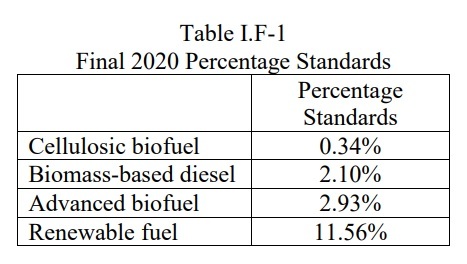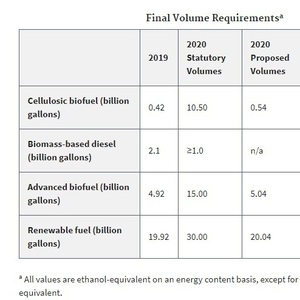API petitions EPA to revise 2020 RFS rule



April 22, 2020
BY Erin Krueger
The American Petroleum Institute sent a letter to U.S EPA Administrator Andrew Wheeler April 6 petitioning the agency to reconsider and revise its final rule that set 2020 renewable volume oblations (RVOs) under the Renewable Fuel Standard and the 2021 RVO for biomass-based diesel.
The petition requests that EPA reconsider the rule’s treatment of small refinery exemptions (SREs) in light of the Tenth Circuit Court’s Jan. 24 ruling that struck down three SREs approved by the agency. API argues that reconsideration of the rule is mandatory because the court’s decision was issued after EPA published the final 2020 RFS rule and “the decision undermines multiple key aspects of the RFS 2020 rule’s treatment of small-refinery-exempt volumes EPA projected would exist in 2020.”
“EPA’s 2020 RFS rule altered the agency’s long-standing approach to accounting for small refinery exemptions,” said API in the petition. Specifically, the rule takes into account volumes of gasoline and diesel that are projected to be exempt during the upcoming compliance year. According to API, the resulting rule effectively shifts RFS obligations from exempt small refineries to other obligated parties. API notes the EPA also announces changes to the way in which it would evaluate SRE requests, and estimated under the new approach it would grant SREs totaling 7.26 billion gallons worth of gasoline and diesel volumes for 2020.
Advertisement
Advertisement
“EPA’s new approach to accounting for small-refinery exemptions significantly increased the [RVOs] for other, non-exempt obligated parties from 10.92 percent total renewable fuel in the original proposal to 11.56 percent,” the API said in the petition.
API argues the Tenth Circuit Court’s decision “demolishes the foundations of EPA’s projections” because it found that several aspects of EPA’s SRE policy are not in accordance with law. In part, the court determined that small refineries must receive an exemption in each year to continue to be eligible for exemptions. As a result, the number of SREs approved by the EPA should be drastically reduced.
API cites Wheeler as acknowledging during congressional testimony that the court’s decision “goes to the heart of the small refinery exemption program.”
“In a revised 2020 rule, EPA should decline to reallocate volumes for small-refinery exemptions not granted as of the date of the final rule,” API said in its petition. “In the alternative, EPA should at a minimum reduce its projections for small-refinery-exempt volumes to account for the [Tenth Circuit Court] decision.”
Advertisement
Advertisement
The Iowa Renewable Fuels Association released a statement on April 21 stressing that revising 2020 blend levels without reversing RFS exemptions would undermine the RFS.
“Thanks to three years of liberally awarded, illegal RFS refinery exemptions, the petroleum industry has enjoyed over 4 billion gallons of biofuel demand destruction and a huge stockpile of RINs they were not required to turn in to EPA,” said Monte Shaw, executive director of the IRFA. “Now, for fear EPA will actually follow the law and apply the Tenth Circuit Court ruling nationwide, petroleum lobbyists are asking the 2020 blend levels be lowered. By this request, API is acknowledging the legitimacy of the Tenth Circuit decision, and essentially agreeing that the last three years of refinery exemptions were illegal and should not have been granted. But API is not asking EPA to reverse those exemptions and restore the four billion destroyed gallons. API wants to continue benefiting from the past illegal exemptions. So their request is not reasonable, it is rank hypocrisy. Unless EPA reverses the past three years of illegal exemptions, lowering the 2020 blend levels would only further punish biofuels producers and farmers at a time when they are already bleeding after years of illegal exemptions, trade disputes, and now COVID-19-driven demand loss.”
A full copy of the petition can be downloaded from the Regulations.gov website.
Related Stories
President Trump on July 4 signed the “One Big Beautiful Bill Act.” The legislation extends and updates the 45Z credit and revives a tax credit benefiting small biodiesel producers but repeals several other bioenergy-related tax incentives.
CARB on June 27 announced amendments to the state’s LCFS regulations will take effect beginning on July 1. The amended regulations were approved by the agency in November 2024, but implementation was delayed due to regulatory clarity issues.
SAF Magazine and the Commercial Aviation Alternative Fuels Initiative announced the preliminary agenda for the North American SAF Conference and Expo, being held Sept. 22-24 at the Minneapolis Convention Center in Minneapolis, Minnesota.
International Sustainability & Carbon Certification has announced that Environment and Climate Change Canada has approved ISCC as a certification scheme in line with its sustainability criteria under its Clean Fuel Regulations.
Legislation introduced in the California Senate on June 23 aims to cap the price of Low Carbon Fuel Standard credits as part of a larger effort to overhaul the state’s fuel regulations and mitigate rising gas prices.
Upcoming Events









